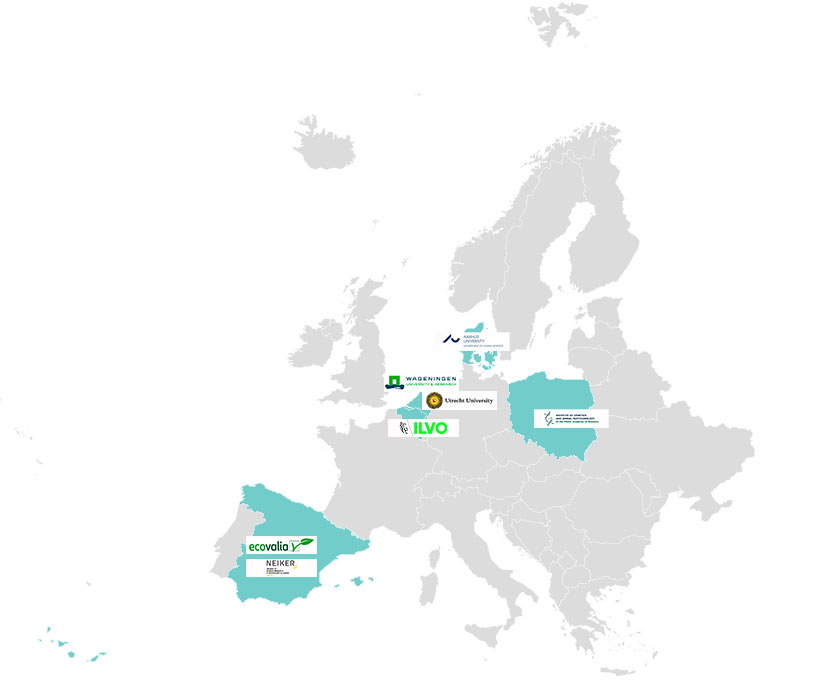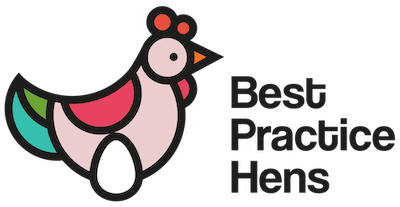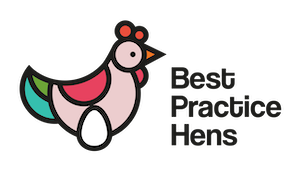Partners
The consortium for this pilot project has been carefully chosen as it assembles all the relevant expertise in laying hen housing, behaviour, economics and welfare and links it to the practical situations in each partner country. The consortium also includes expertise in dissemination and excellent channels to the industry in target countries.


The School of Veterinary Medicine at Utrecht in The Netherlands, as a part of the Faculty of Veterinary Medicine at Utrecht University, is the only place in the Netherlands where veterinarians are trained. The Faculty of Veterinary Medicine (and thus the School of Veterinary Medicine) is the centre of expertise and point of reference for veterinary issues for the entire country, and increasingly for the world abroad as well. Our activities include providing primary health and welfare care for a variety of types of animals, monitoring food safety and the prevention of zoonoses (diseases transferable from animals to humans). The Faculty of Veterinary Medicine is considered one of the leading veterinary medicine faculties in Europe and is ranked in the top ten world-wide. The School of Veterinary Medicine is not only accredited by European organisations, but by the umbrella organisations in the United States and Canada as well.
The staff and students of the Faculty of Veterinary Medicine perform fundamental and strategic research in the fields of animal health, diseases and welfare, and into related aspects of public health and the environment. This research is organised into five thematic interdisciplinary research programmes to stimulate scientific innovation on the interface between disciplines and to offer talented scientists a challenging research environment. These are interfacultary, multidisciplinary fields of research in which proven, high-quality research programmes have been bundled together. In addition, the Faculty performs research with the purpose of training veterinary specialists, with the goal of maintaining our leading position in specialist veterinary fields, including those that are outside of the focus of the thematic programmes. All of the Faculty of Veterinary Medicine’s research is performed under the auspices of the Institute for Veterinary Research (IVR).
Website: https://www.uu.nl/en/organisation/faculty-of-veterinary-medicine
Contact: Prof. T. Bas Rodenburg (t.b.rodenburg@uu.nl) – project leader

Aarhus University (AU) in Denmark is a public university that is internationally recognised for the high quality of its research, research-based degree programmes and public sector government consultancy, in addition to value-creating collaboration with private businesses, public sector institutions and civil society. AU has around 38,000 students, 10,700 employees, 1,800 PhD-students and close to 1,000 postdoctoral scholars. AU has an increasing number of international research and innovation partnerships, and is partner in 383 H2020 collaborative projects (278 in FP7), 36 (21) of these as coordinator. It also hosts / has hosted 61 ERC projects, and it has a strong track record of attracting individual fellowships and hosting visiting researchers at all career stages for both training and knowledge transfer purposes.
At the Department of Animal Science (ANIS), Aarhus University (Denmark), basic, strategic and applied research is carried out in issues relating to the nutrition, health and welfare of livestock. In the Welfare unit, scientists have extensive research skills in on-farm welfare assessment, animal behaviour and stress biology, veterinary epidemiology, animal health economics, herd health management, targeting the interactions between farmers, advisors, retailers, consumers and the authorities. The Welfare unit produces and disseminates new knowledge on the behavioural needs, stress biology and adaptability of domesticated animals in order to ensure animal welfare and health when used for production and research. Furthermore, the Welfare unit develops and evaluates animal models of pain, mental states, behaviour and stress, and contributes with new knowledge on behaviour, stress reactions and adaptability of farm animals. This knowledge is used for developing and evaluating new barn systems and production principles, and for working out guidelines for improved animal welfare in housing, handling and transport of farm animals.
Website: https://anis.au.dk/en/
Contact person: Anja Brinch Riber (anja.riber@anis.au.dk)

Asociación Valor Ecológico, CAAE (ECOVALIA) is a non-profit organization in Spain that promotes organic farming and responsible consumption, with true spirit of leadership and service to society. In 1991, it began its activity as being one of the first pioneering organic farming organization in Spain. Since then, ECOVALIA promotes innovative responses to the challenges posed by modern society, providing solutions for healthy eating, as well as respect for the land and recognition for the man and woman who live and work in the countryside. We act as intermediaries, representing the interests of the organic sector in Spain.
Currently, ECOVALIA is one of the leading organisations in Europe both in number of associates and in number of initiatives focused on the development of the organic sector. Ecovalia is involved in many national projects and activities for the promotion of the organic agriculture and to setup the strategy for the organic sector in Spain. Currently involved in 7 European projects under Horizon 2020, ERAMUS + and EU tender. Moreover, ECOVALIA organizes different in-class and online training courses on organic farming and related topics to organic farmers and other stakeholders.
Website: www.ecovalia.org
Contact persons: Ángela Morell Pérez and Évelyne Alcázar Marín (ecovalia.international@ecovalia.org)

The Institute of Genetics and Biotechnology of the Polish Academy of Sciences (IGABPAS) belongs to the Faculty of Biological and Agricultural Sciences of the Polish Academy of Sciences. Is one of the leading institutions in the field of animal genetics, breeding and biotechnology and available in the last category of the Ministry of Science and Higher Education of the category A. It has the prestigious status of the National Leading Scientific Center and Technology of Excellence in Genomics, Biotechnology and Quality of Products of Animal Origin from Animal Welfare ANIMBIOGEN in the EU.
The mission of the Institute is to conduct scientific research and disseminate knowledge in the field of genetics and biotechnology of animals for innovation, biological progress and food security for the development of the economy and improvement of the quality of life of the society. The principal fields of the basic research include: molecular genetics, experimental embryology, animal biotechnology, and the genetic basis of stress physiology and animal ethology. Moreover, applied research is conducted in the fields of population genetics, animal breeding, as well as animal maintenance and production systems. Studies on animal behaviour and welfare are an important complement. The principal purpose of applied research is the elaboration of such methods of animal improvement and sustainable production systems which aim at obtaining safe and functional food, ensuring a high level of animal welfare and limiting the unfavourable effect of agriculture on the natural environment.
Website: www.igbzpan.pl
Contact persons: Joanna Marchewka (J.Marchewka@igbzpan.pl) and Patryk Sztandarski (p.sztandarski@igbzpan.pl)

EV ILVO was created in 2005 within ILVO, the Flanders Research Institute for Agriculture, Fisheries and Food as a legal entity with a corporate personality. In practice, ILVO and EV ILVO operate as one research institute (ILVO) with the same management and located at the same address (Merelbeke, in the vicinity of Ghent (Belgium)). ILVO has more than 600 employees (50% researchers) with approximately 420 employees for EV ILVO itself. These are grouped in 4 units: Plant Sciences, Animal Sciences, Technology & Food Sciences and Social Sciences. EV ILVO works collaboratively at national and international level to promote economically, ecologically and socially sustainable agriculture, fisheries and agrofood production.
The Animal Sciences unit of EV ILVO focuses on sustainable cattle, pig and small livestock husbandry. It aims to support farmers achieving cost-effective livestock farming systems, considering the most important societal challenges such as the impact on climate and environment, animal welfare, tasteful and healthy products and valorization of feed materials. EV ILVO develops innovative animal and environment-friendly agricultural systems with solid expertise in precision livestock farming and precision crop farming. It integrates these novelties in innovative production systems. It combines technical competence with mathematical and IT-based methods. As a leading governmental research institute, ILVO conducts policy-supporting scientific research and the associated public service in view of a sustainable agricultural, fisheries and agrofood production in an economic, ecological and social perspective.
Website: www.ilvo.vlaanderen.be
Contact person: Frank Tuyttens (Frank.Tuyttens@ilvo.vlaanderen.be)

NEIKER is working for the Basque Agro-livestock and forestry sector. It has been developing this work, since its birth in 1851, thanks to the efforts of a group of very highly qualified professionals who enjoy international recognition. They are a public body dedicated to providing a service to our production fabric and to society; committed to a management model fashioned on the basis of excellence and in keeping with internationally recognised quality criteria. Thanks to its capacity, the team generates knowledge and innovative, transferable solutions which contribute added value and improve the competitiveness of the agri-food and forestry sector.
NEIKER carries out this work according to the objectives established by the Basque Government Ministry of Economic Development and Infrastructures, maintaining a great deal of respect for the environment and the sustainability of our surroundings while actively contributing to local economic and social development. Neiker helps to improve competitiveness of the sector, preserve our environment, conserve our native species and breeds and guarantee food safety.
Website: www.neiker.eus
Contact person: Inma Estevez (iestevez@neiker.eus)

The mission of Wageningen University & Research is “To explore the potential of nature to improve the quality of life”. Within Wageningen University & Research, nine specialised research institutes from the Wageningen Research Foundation and Wageningen University have joined forces to help answer the most important questions in the domain of healthy food and living environment. With approximately 30 locations, 5,000 employees, and 10,000 students, Wageningen University & Research is one of the leading organisations in its domain worldwide. An integrated approach to problems and the cooperation between various disciplines are at the heart of the unique approach of Wageningen.
Website: www.wur.nl
The research institutes involved in this project are Wageningen Livestock Research and Wageningen Economic Research:
Wageningen Livestock Research is carrying out fundamental, innovative research and practical solutions for sustainable and profitable livestock farming. These are the 5 areas of expertise: Animal breeding and genomics, Animal health and welfare, Animal nutrition, Livestock environment and livestock development internationally.
Contact person: Thea van Niekerk (thea.vanniekerk@wur.nl)
Wageningen Economic Research is an internationally leading socio-economic research institute that offers governments and companies insights and advice for sound policies and better decision-making. Wageningen Economic Research has a nationally and internationally proven track record and extensive experience in setting up and carrying out policy analyses, including social cost/benefit analyses, impact evaluations, and future studies, as well as market and chain research, consumer research and the development of monitoring system for industry. It relies on high-quality market and chain knowledge, a wide and international knowledge network, and unique data and models from the micro to the macro level.
Contact person: Peter van Horne (peter.vanhorne@wur.nl)









